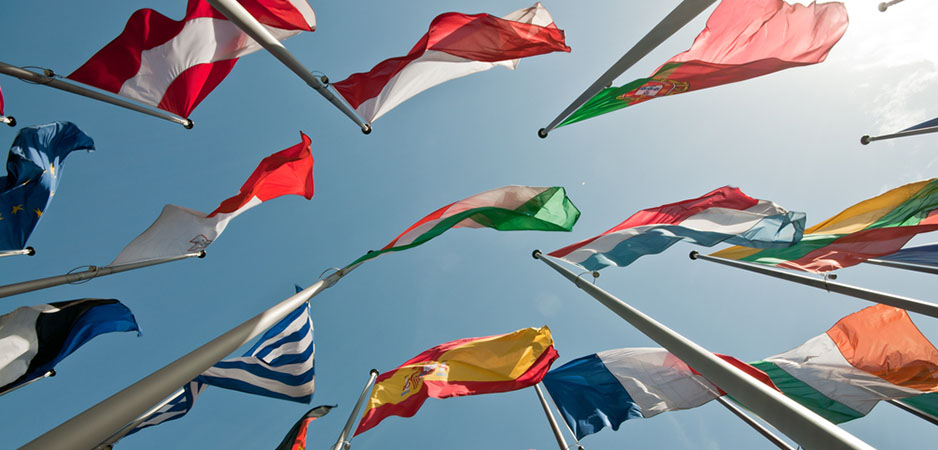What are the challenges ahead for young people in Europe? These activists give their view.
The Congress of Young Europeans, organized and hosted by the Heinrich Böll Foundation, among others, was a unique gathering of 70 young activists and future politicians from across Europe. Held in Prague, Czech Republic, between August 30 and September 2, the event provided participants with a chance to discuss their concerns for the future of democratic institutions in Europe, as well as education, immigration and climate change.
The four-day summit was an opportunity for young activists, mostly working with green parties in their respective countries, to engage in networking, debates, workshops, film screenings, Q&A sessions and talks with artists, politicians, authors, influencers and like-minded youths from the continent.
I had the opportunity to talk to seven participants at the congress and ask them a question: What is the most important challenge facing young people in Europe today?
The following are their responses. The transcript has been edited for clarity.
Teo Comet, Finland, secretary general of the Federation of Young European Greens
I think one of the most pressing issues for young people in Europe today is how we relate as Europeans to the rest of the world — in terms of other people, individuals and communities, but also in terms of other countries, states and governments. It’s really crucial to be aware that there is a lot of movement in the world, and these movements are not necessarily going to stop. We are not going to stop migration patterns by closing down the borders.
The UNHCR [United Nations High Commissioner for Refugees] is estimating that there will be around 250 million climate refugees by mid-century. How we relate to these people is very important. Do we consider these people as humans, or do we continue with some dehumanizing tendencies that we are unfortunately seeing in Europe these days with the rise of far right?
Also, our relations with the rest of the world is related to the big, important economic processes, including relations with China, Africa, Latin America and the United States, which is becoming more and more unpredictable. It puts forward the question: How do we see Europe’s role in the world? Are we going to be an irrelevant part that, at some point, had a big influence on the world, or are we going to play a constructive role on the big economic, social and ecological developments happening around the world?
Visar Xhambazi, Kosovo, research fellow at the Pristina Institute for Political Studies
I think one of the biggest challenges is the social inequality since the 2008 financial meltdown. You see many youngsters, especially from the southern part of Europe, trying to make a living and be independent and they are facing many difficulties. The other thing is the rise of right-wing extremism. I think it’s making it very difficult for young people to find themselves and have a potential career.
Dominik Kirchdorfer, Austria, president of European Future Forum
There are many different challenges for young people. Particularly one of the biggest challenges is currently unemployment. But I would also say there’s also education. We are currently going through a new kind of industrial revolution, which is a digital revolution. It’s going to change lot at the labor market. Because our education system is unreformed, and it’s the same thing we had 200 years ago during the Industrial Revolution. It’s not prepared for the shifts that are going to occur in the labor market. So, unless we change our education system, young people, whether they stay young now or age in the next 10 to 20 years, will face extreme problems in the labor market.
I don’t see any solutions being implemented, but there are lots of people talking about it. I would suggest, if you’d like to get started and read, Andreas Schleicher, the head of education at the OECD [Organisation for Economic Co-operation and Development] just published a book titled, How to Build a 21st-Century School System, which was really fruitful.
 The EU Commission is also looking into the challenges posed by the labor [market] and how it affects education reforms. I think Finland is making good progress on this, and China as well. They are changing their education system from absorbing knowledge to learning critical soft skills. We need critical thinking, but we also need creative thinking.
The EU Commission is also looking into the challenges posed by the labor [market] and how it affects education reforms. I think Finland is making good progress on this, and China as well. They are changing their education system from absorbing knowledge to learning critical soft skills. We need critical thinking, but we also need creative thinking.
Mariam Vatsadze, Georgia, board member of Georgian Young Greens
I think the most important challenge that Europe faces is nationalism and the emerging neo-fascist forces, which is equivalent to an attack on the main European values. Capitalism, patriarchy and climate change challenges are also very important, but nationalism is making everything terrible.
When people are oppressed, their voices are stolen by the ultra-rightists. People are expressing their sentiments in wrong ways. Nationalism is not only loving your country; it means excluding minorities from society and promoting male-dominant patriarchy.
Emese Gyongyosi, Hungary, former member of Együtt Political Party
I think the biggest challenge that young people face is the negative effect of digitalization and social media. The motive behind appearance on social media is leaving a good impression on other people, and this drives their attention [away] from important matters. The so-called showing off, posting pictures, consumerism and focusing on not important matters will end in ignorance toward important issues. I see a huge ignorance about politics in my country. Young people don’t really care about these issues. I think it’s really a big challenge. The people who are under 22 years old will have huge problems.
It’s really hard to find a solution. When I was born, there was no internet. For me, it’s absolutely normal to socialize in a regular way and in the real world. But, unfortunately, these kids were born with internet and mobile phones almost in their hands, and it’s really hard to take it away from them. If teachers and parents don’t interfere, there’s not a lot we can do about it. It’s about education, but it’s not only about school and must start a lot earlier. When kids are 2 or 3 years old, parents shouldn’t give them mobile phones. However, finding a solution is really difficult.
Ricardo Alexandre Marques Silva, Portugal, ecologist at Associação Zero
Young people are facing [many] challenges. We are facing the challenge of populism, which basically wants to destroy what our past generations achieved since the European Union and other European institutions were founded. Then we have the rise of right-wing and extremist parties who want to destroy our European values, which are solidarity and respect for differences.
We need to think and we need to pay attention to what’s going on in the world. We have to avoid the extremist and populist rhetoric. To solve these problems, we need to find solutions, and that’s why we vote and take part in electoral and political campaigns. Young people should pay more attention and be more focused on building alternatives to populist forces, and we can realize it through dialogue.
Tereza Vránková, Czech Republic, member of Czech Young Greens
I think the challenge is that young people, especially in the countryside, don’t have access to the knowledge about policy, institutions and especially about the European Union institution. There’s this problem in the Czech Republic, for example, that we are still scared of having proper education about democracy and decision-making. Because we think if we teach people about policy, then it’s propagandistic.
I think that’s a problem because there is a difference between propaganda and knowledge-sharing. People lack knowledge, especially young people, and in the context I grew up — connected to communism — people were not supposed to be part of democracy and decision-making processes, and we had teachers who were not allowed to participate in similar processes. We already have the opportunity, but we don’t have the teachers to tell us that we do.
What really works and what worked for me is to have long-term visions. For example, we had a European green activists training. In five different countries, we had 20 people going through weekend sessions and different levels of policymaking — first the regional level, then the state level, then the European Union level, then they go to Brussels and meet other people from other countries. They share their experiences and views, and it’s important because each country is different. And then they come back and implement a project. They try it very practically. It’s not that you are just sitting and receiving information. You are participating in the process already. Even though it’s training, it’s very practical. If it’s practical, then it works.
The views expressed in this article are the author’s own and do not necessarily reflect Fair Observer’s editorial policy.
Support Fair Observer
We rely on your support for our independence, diversity and quality.
For more than 10 years, Fair Observer has been free, fair and independent. No billionaire owns us, no advertisers control us. We are a reader-supported nonprofit. Unlike many other publications, we keep our content free for readers regardless of where they live or whether they can afford to pay. We have no paywalls and no ads.
In the post-truth era of fake news, echo chambers and filter bubbles, we publish a plurality of perspectives from around the world. Anyone can publish with us, but everyone goes through a rigorous editorial process. So, you get fact-checked, well-reasoned content instead of noise.
We publish 2,500+ voices from 90+ countries. We also conduct education and training programs
on subjects ranging from digital media and journalism to writing and critical thinking. This
doesn’t come cheap. Servers, editors, trainers and web developers cost
money.
Please consider supporting us on a regular basis as a recurring donor or a
sustaining member.
Will you support FO’s journalism?
We rely on your support for our independence, diversity and quality.






